TRIS (CAS No. 77-86-1) Market Insights 2025, Analysis and Forecast to 2030, by Manufacturers, Regions, Technology, Application
- Single User License (1 Users) $ 3,200
- Team License (2~5 Users) $ 4,200
- Corporate License (>5 Users) $ 5,200
Introduction
The TRIS (CAS No. 77-86-1) market, also known as tris(hydroxymethyl)aminomethane or trometamol, represents a critical segment within the specialty chemicals industry focused on pH buffering and pharmaceutical applications. TRIS (CAS No. 77-86-1), with the chemical formula NH2C(CH2OH)3 and CAS number 77-86-1, is a highly versatile organic compound that serves multiple functions across diverse industries. This white crystalline solid possesses unique properties that make it indispensable in biological research, pharmaceutical formulations, cosmetic applications, and various industrial processes.
The compound's primary value lies in its exceptional buffering capacity within the pH range of 7.2-9.0, making it essential for maintaining stable pH conditions in biological systems and chemical processes. TRIS (CAS No. 77-86-1)'s biocompatibility, low toxicity profile, and excellent solubility characteristics have established it as a preferred choice in pharmaceutical intermediates, particularly in the synthesis of fosfomycin trometamol and other antibiotic formulations. The compound also serves as a mild and safe additive in cosmetic formulations, appearing in premium skincare products from leading brands across Asian, European, and American markets.
The global TRIS (CAS No. 77-86-1) market benefits from diverse application areas including cryopreservation media, chromatography applications, diagnostic tests, electrophoresis procedures, and various pharmaceutical formulations. The compound's role as a temperature-stable buffer makes it particularly valuable in laboratory settings and clinical applications where pH stability is crucial for accurate results and product efficacy.
Market Size and Growth Forecast
The global TRIS (CAS No. 77-86-1) market is projected to reach USD 600-800 million by 2025, with an estimated compound annual growth rate (CAGR) of 5%-7% through 2030. This growth trajectory is supported by expanding pharmaceutical research and development activities, increasing demand for high-quality buffer systems in biotechnology applications, and the growing cosmetics industry's preference for safe and effective additives.
Regional Analysis
Asia Pacific is expected to lead the TRIS (CAS No. 77-86-1) market with a growth rate of 6%-8%, driven primarily by China, India, and Japan. China's dominant position in pharmaceutical manufacturing and its rapidly expanding biotechnology sector create substantial demand for high-purity trometamol. The country's significant investments in healthcare infrastructure and pharmaceutical research support sustained market growth. India's growing pharmaceutical industry, known for its generic drug production capabilities, drives consistent demand for pharmaceutical intermediates including trometamol. Japan's advanced biotechnology research sector and stringent quality requirements for pharmaceutical and cosmetic applications support premium market segments.
North America follows with a growth rate of 5%-7%, led by the United States where extensive pharmaceutical research, biotechnology innovation, and advanced healthcare systems drive demand. The region's emphasis on high-quality research reagents and pharmaceutical intermediates, combined with significant investments in life sciences research, supports steady market expansion. The presence of major pharmaceutical companies and research institutions creates consistent demand for specialized buffer systems.
Europe demonstrates a growth rate of 4%-6%, with Germany, Switzerland, and the United Kingdom representing key markets. The region's strong pharmaceutical industry, emphasis on regulatory compliance, and advanced cosmetic sector drive demand for high-purity trometamol. European companies' focus on sustainable and bio-compatible ingredients in both pharmaceutical and cosmetic applications supports market growth.
South America exhibits a growth rate of 4%-6%, primarily driven by Brazil and Mexico where expanding pharmaceutical sectors and improving healthcare infrastructure create emerging opportunities. However, economic volatility and regulatory challenges may constrain growth in certain markets within the region.
The Middle East and Africa region shows a growth rate of 3%-5%, with the United Arab Emirates and South Africa leading consumption. The region's developing pharmaceutical sectors and increasing investments in healthcare infrastructure create gradual market expansion opportunities.
Application Analysis
Pharmaceutical: This segment represents the largest application area with an expected growth rate of 6%-8%. TRIS (CAS No. 77-86-1) serves as a crucial pharmaceutical intermediate, particularly in antibiotic synthesis such as fosfomycin trometamol. The compound's biocompatibility and buffering properties make it essential in vaccine formulations and injectable drug preparations. Growing pharmaceutical research and development activities, particularly in emerging markets, drive segment expansion.
Cryopreservation Media: Projected to grow at 5%-7%, this application leverages trometamol's ability to maintain pH stability under extreme temperature conditions. The compound is essential in cell and tissue preservation protocols used in biotechnology research, reproductive medicine, and regenerative therapy applications. Advances in personalized medicine and biobanking drive demand in this segment.
Chromatography: With growth estimated at 5%-6%, this segment utilizes TRIS (CAS No. 77-86-1) in various analytical and preparative chromatography applications. The compound's pH buffering capabilities are crucial for maintaining consistent separation conditions in pharmaceutical analysis, protein purification, and research applications. The expanding biotechnology sector drives consistent demand.
Cosmetics: Expected to grow at 6%-7%, this segment benefits from TRIS (CAS No. 77-86-1)'s mild and safe profile as a cosmetic additive. The compound appears in premium skincare products, including popular Asian and Western brands known for their moisturizing and anti-aging properties. The growing demand for safe and effective cosmetic ingredients supports segment growth.
Diagnostic Tests: This application grows at 4%-6%, utilizing TRIS (CAS No. 77-86-1)'s buffering properties in various diagnostic assays and clinical testing procedures. The compound ensures accurate and reproducible results in medical diagnostics, supporting the healthcare industry's quality requirements.
Electrophoresis: With growth of 4%-5%, this segment uses TRIS (CAS No. 77-86-1) in buffer systems for protein and nucleic acid analysis. The compound's stable pH characteristics are essential for consistent electrophoretic separations in research and clinical laboratories.
Key Market Players
Advancion: Formerly known as ANGUS Chemical Company until 2023, Advancion is a leading specialty chemicals manufacturer with significant expertise in amine-based compounds including TRIS (CAS No. 77-86-1). The company focuses on high-purity applications and maintains strong technical support capabilities for pharmaceutical and industrial customers globally.
Sigma-Aldrich: A premier supplier of research chemicals and laboratory reagents, Sigma-Aldrich provides high-purity TRIS (CAS No. 77-86-1) for research and pharmaceutical applications. The company's extensive distribution network and quality assurance programs make it a preferred supplier for laboratory and industrial users worldwide.
VWR: A global laboratory supply and services company offering TRIS (CAS No. 77-86-1) products for research and analytical applications. VWR's comprehensive product portfolio and technical support services serve the scientific research community across multiple industries.
Hopax: A specialty chemical manufacturer focusing on pharmaceutical-grade TRIS (CAS No. 77-86-1) and other fine chemicals. The company emphasizes quality manufacturing and regulatory compliance for pharmaceutical applications, serving both domestic and international markets.
Changzhou Welton Chemical: A Chinese manufacturer specializing in pharmaceutical intermediates and fine chemicals including TRIS (CAS No. 77-86-1). The company focuses on cost-effective production while maintaining quality standards for pharmaceutical applications.
Hubei Grand Fuchi Pharmaceutical & Chemicals Co. Ltd: A Chinese pharmaceutical chemical manufacturer with an annual production capacity of 2,000 tons for TRIS (CAS No. 77-86-1). The company serves both domestic and international pharmaceutical markets with focus on quality and regulatory compliance.
Suzhou Yacoo Science: A Chinese specialty chemicals company that completed construction and commissioning of a 2,000 tons per year TRIS (CAS No. 77-86-1) production facility in 2021. The company focuses on serving pharmaceutical and research markets with high-quality products.
Shandong Hongsen Biotechnology: A Chinese manufacturer that completed construction and began trial production of a 1,000-ton TRIS (CAS No. 77-86-1) facility at the end of 2023. The company represents the ongoing expansion of production capacity in China to meet growing market demand.
Hubei Jiangyan Tianxiang Chemical: A Chinese chemical manufacturer focusing on pharmaceutical intermediates and specialty chemicals including TRIS (CAS No. 77-86-1) for various industrial applications.
Fujian Shaowu Dolphin Pharmaceutical Technology: A Chinese company planning to complete construction of a 1,000-ton annual production capacity TRIS (CAS No. 77-86-1) facility by 2025, demonstrating the continued investment in production capacity expansion to meet market demand.
Porter's Five Forces Analysis
●Threat of New Entrants: Moderate. The TRIS (CAS No. 77-86-1) market presents moderate barriers to entry, primarily related to regulatory compliance requirements for pharmaceutical-grade products and the need for specialized manufacturing capabilities. However, the relatively straightforward synthesis process and growing market demand create opportunities for new players, particularly in emerging markets.
●Threat of Substitutes: Low to Moderate. While alternative buffering agents exist, TRIS (CAS No. 77-86-1)'s unique combination of biocompatibility, pH range, and stability characteristics makes it difficult to replace in many applications. However, specialized applications may utilize alternative buffer systems depending on specific requirements.
●Bargaining Power of Buyers: Moderate. Large pharmaceutical companies and research institutions have significant negotiating power due to volume purchases. However, the specialized nature of pharmaceutical-grade TRIS (CAS No. 77-86-1) and strict quality requirements limit switching options for critical applications.
●Bargaining Power of Suppliers: Moderate. Raw material suppliers maintain some leverage due to the specialized nature of certain chemical precursors. However, multiple sourcing options and the relatively common availability of basic raw materials balance supplier power.
●Competitive Rivalry: High. The market features intense competition among established players, particularly in pharmaceutical-grade products where quality, regulatory compliance, and technical support are crucial differentiators. Price competition is significant in commodity-grade applications.
Market Opportunities and Challenges
Opportunities
●Growing Pharmaceutical Industry: The global expansion of pharmaceutical research and development, particularly in biotechnology and personalized medicine, creates increasing demand for high-quality buffer systems and pharmaceutical intermediates. Emerging markets' pharmaceutical sector development presents significant growth opportunities.
●Biotechnology Advancement: Rapid developments in biotechnology research, including cell therapy, gene therapy, and regenerative medicine, drive demand for specialized cryopreservation media and buffer systems. The growing biobanking industry creates sustained demand for high-quality TRIS (CAS No. 77-86-1).
●Cosmetic Industry Growth: The expanding global cosmetics market, particularly in Asia Pacific regions, creates opportunities for TRIS (CAS No. 77-86-1) as a safe and effective cosmetic additive. Consumer preference for premium skincare products supports demand for high-quality ingredients.
●Regulatory Compliance Requirements: Increasing regulatory standards for pharmaceutical and cosmetic products create demand for high-purity, well-documented TRIS (CAS No. 77-86-1) products. Companies with strong regulatory compliance capabilities gain competitive advantages.
●Diagnostic Market Expansion: The growing healthcare diagnostics market, driven by aging populations and increasing health awareness, creates consistent demand for diagnostic reagents and buffer systems containing TRIS (CAS No. 77-86-1).
Challenges
●Quality and Regulatory Requirements: Meeting stringent pharmaceutical and cosmetic industry quality standards requires significant investments in manufacturing facilities, quality control systems, and regulatory compliance. Maintaining consistent product quality across different production batches presents ongoing challenges.
●Raw Material Price Fluctuations: Volatility in the prices of chemical precursors and raw materials impacts production costs and profit margins. Supply chain disruptions can affect manufacturing operations and customer deliveries.
●Competition from Low-Cost Producers: Increasing competition from manufacturers in developing regions offering lower-priced products creates pricing pressure on established players. Maintaining market share while preserving profit margins requires continuous efficiency improvements.
●Environmental and Safety Regulations: Evolving environmental and safety regulations require ongoing investments in manufacturing processes and waste management systems. Compliance costs may impact profitability, particularly for smaller manufacturers.
●Technical Specifications Complexity: Meeting diverse and evolving technical specifications across multiple application areas requires continuous product development and technical support capabilities. Customers' increasing demands for customized solutions present both opportunities and challenges for manufacturers.
Chapter 1 Executive Summary
Chapter 2 Abbreviation and Acronyms
Chapter 3 Preface
3.1 Research Scope
3.2 Research Sources
3.2.1 Data Sources
3.2.2 Assumptions
3.3 Research Method
Chapter 4 Market Landscape
4.1 Market Overview
4.2 Classification/Types
4.3 Application/End Users
Chapter 5 Market Trend Analysis
5.1 Introduction
5.2 Drivers
5.3 Restraints
5.4 Opportunities
5.5 Threats
Chapter 6 Industry Chain Analysis
6.1 Upstream/Suppliers Analysis
6.2 Tris (Cas No. 77-86-1) Analysis
6.2.1 Technology Analysis
6.2.2 Cost Analysis
6.2.3 Market Channel Analysis
6.3 Downstream Buyers/End Users
Chapter 7 Latest Market Dynamics
7.1 Latest News
7.2 Merger and Acquisition
7.3 Planned/Future Project
7.4 Policy Dynamics
Chapter 8 Trading Analysis
8.1 Export of Tris (Cas No. 77-86-1) by Region
8.2 Import of Tris (Cas No. 77-86-1) by Region
8.3 Balance of Trade
Chapter 9 Historical and Forecast Tris (Cas No. 77-86-1) Market in North America (2020-2030)
9.1 Tris (Cas No. 77-86-1) Market Size
9.2 Tris (Cas No. 77-86-1) Demand by End Use
9.3 Competition by Players/Suppliers
9.4 Type Segmentation and Price
9.5 Key Countries Analysis
9.5.1 United States
9.5.2 Canada
9.5.3 Mexico
Chapter 10 Historical and Forecast Tris (Cas No. 77-86-1) Market in South America (2020-2030)
10.1 Tris (Cas No. 77-86-1) Market Size
10.2 Tris (Cas No. 77-86-1) Demand by End Use
10.3 Competition by Players/Suppliers
10.4 Type Segmentation and Price
10.5 Key Countries Analysis
10.5.1 Brazil
10.5.2 Argentina
10.5.3 Chile
10.5.4 Peru
Chapter 11 Historical and Forecast Tris (Cas No. 77-86-1) Market in Asia & Pacific (2020-2030)
11.1 Tris (Cas No. 77-86-1) Market Size
11.2 Tris (Cas No. 77-86-1) Demand by End Use
11.3 Competition by Players/Suppliers
11.4 Type Segmentation and Price
11.5 Key Countries Analysis
11.5.1 China
11.5.2 India
11.5.3 Japan
11.5.4 South Korea
11.5.5 Asean
11.5.6 Australia
Chapter 12 Historical and Forecast Tris (Cas No. 77-86-1) Market in Europe (2020-2030)
12.1 Tris (Cas No. 77-86-1) Market Size
12.2 Tris (Cas No. 77-86-1) Demand by End Use
12.3 Competition by Players/Suppliers
12.4 Type Segmentation and Price
12.5 Key Countries Analysis
12.5.1 Germany
12.5.2 France
12.5.3 United Kingdom
12.5.4 Italy
12.5.5 Spain
12.5.6 Belgium
12.5.7 Netherlands
12.5.8 Austria
12.5.9 Poland
12.5.10 Russia
Chapter 13 Historical and Forecast Tris (Cas No. 77-86-1) Market in MEA (2020-2030)
13.1 Tris (Cas No. 77-86-1) Market Size
13.2 Tris (Cas No. 77-86-1) Demand by End Use
13.3 Competition by Players/Suppliers
13.4 Type Segmentation and Price
13.5 Key Countries Analysis
13.5.1 Egypt
13.5.2 Israel
13.5.3 South Africa
13.5.4 Gulf Cooperation Council Countries
13.5.5 Turkey
Chapter 14 Summary For Global Tris (Cas No. 77-86-1) Market (2020-2030)
14.1 Tris (Cas No. 77-86-1) Market Size
14.2 Tris (Cas No. 77-86-1) Demand by End Use
14.3 Competition by Players/Suppliers
14.4 Type Segmentation and Price
Chapter 15 Global Tris (Cas No. 77-86-1) Market Forecast (2021-2026)
15.1 Tris (Cas No. 77-86-1) Market Size Forecast
15.2 Tris (Cas No. 77-86-1) Demand Forecast
15.3 Competition by Players/Suppliers
15.4 Type Segmentation and Price Forecast
Chapter 16 Analysis of Global Key Vendors
15.1 Advancion
15.1.1 Company Profile
15.1.2 Main Business and TRIS (CAS No. 77-86-1) Information
15.1.3 SWOT Analysis of Advancion
15.1.4 Advancion TRIS (CAS No. 77-86-1) Sales, Revenue, Price and Gross Margin (2020-2025)
15.2 Sigma-Aldrich
15.2.1 Company Profile
15.2.2 Main Business and TRIS (CAS No. 77-86-1) Information
15.2.3 SWOT Analysis of Sigma-Aldrich
15.2.4 Sigma-Aldrich TRIS (CAS No. 77-86-1) Sales, Revenue, Price and Gross Margin (2020-2025)
15.3 VWR
15.3.1 Company Profile
15.3.2 Main Business and TRIS (CAS No. 77-86-1) Information
15.3.3 SWOT Analysis of VWR
15.3.4 VWR TRIS (CAS No. 77-86-1) Sales, Revenue, Price and Gross Margin (2020-2025)
15.4 Hopax
15.4.1 Company Profile
15.4.2 Main Business and TRIS (CAS No. 77-86-1) Information
15.4.3 SWOT Analysis of Hopax
15.4.4 Hopax TRIS (CAS No. 77-86-1) Sales, Revenue, Price and Gross Margin (2020-2025)
15.5 Changzhou Welton Chemica
15.5.1 Company Profile
15.5.2 Main Business and TRIS (CAS No. 77-86-1) Information
15.5.3 SWOT Analysis of Changzhou Welton Chemica
15.5.4 Changzhou Welton Chemica TRIS (CAS No. 77-86-1) Sales, Revenue, Price and Gross Margin (2020-2025)
Please ask for sample pages for full companies list
Table Research Scope Of Tris (Cas No. 77-86-1) Report
Table Data Sources Of Tris (Cas No. 77-86-1) Report
Table Major Assumptions Of Tris (Cas No. 77-86-1) Report
Table Tris (Cas No. 77-86-1) Classification
Table Tris (Cas No. 77-86-1) Applications List
Table Drivers Of Tris (Cas No. 77-86-1) Market
Table Restraints Of Tris (Cas No. 77-86-1) Market
Table Opportunities Of Tris (Cas No. 77-86-1) Market
Table Threats Of Tris (Cas No. 77-86-1) Market
Table Raw Materials Suppliers List
Table Different Production Methods Of Tris (Cas No. 77-86-1)
Table Cost Structure Analysis Of Tris (Cas No. 77-86-1)
Table Key End Users List
Table Latest News Of Tris (Cas No. 77-86-1) Market
Table Merger And Acquisition List
Table Planned/Future Project Of Tris (Cas No. 77-86-1) Market
Table Policy Of Tris (Cas No. 77-86-1) Market
Table 2020-2030 Regional Export Of Tris (Cas No. 77-86-1)
Table 2020-2030 Regional Import Of Tris (Cas No. 77-86-1)
Table 2020-2030 Regional Trade Balance
Table 2020-2030 North America Tris (Cas No. 77-86-1) Market Size And Market Volume List
Table 2020-2030 North America Tris (Cas No. 77-86-1) Demand List By Application
Table 2020-2025 North America Tris (Cas No. 77-86-1) Key Players Sales List
Table 2020-2025 North America Tris (Cas No. 77-86-1) Key Players Market Share List
Table 2020-2030 North America Tris (Cas No. 77-86-1) Demand List By Type
Table 2020-2025 North America Tris (Cas No. 77-86-1) Price List By Type
Table 2020-2030 United States Tris (Cas No. 77-86-1) Market Size And Market Volume List
Table 2020-2030 United States Tris (Cas No. 77-86-1) Import & Export List
Table 2020-2030 Canada Tris (Cas No. 77-86-1) Market Size And Market Volume List
Table 2020-2030 Canada Tris (Cas No. 77-86-1) Import & Export List
Table 2020-2030 Mexico Tris (Cas No. 77-86-1) Market Size And Market Volume List
Table 2020-2030 Mexico Tris (Cas No. 77-86-1) Import & Export List
Table 2020-2030 South America Tris (Cas No. 77-86-1) Market Size And Market Volume List
Table 2020-2030 South America Tris (Cas No. 77-86-1) Demand List By Application
Table 2020-2025 South America Tris (Cas No. 77-86-1) Key Players Sales List
Table 2020-2025 South America Tris (Cas No. 77-86-1) Key Players Market Share List
Table 2020-2030 South America Tris (Cas No. 77-86-1) Demand List By Type
Table 2020-2025 South America Tris (Cas No. 77-86-1) Price List By Type
Table 2020-2030 Brazil Tris (Cas No. 77-86-1) Market Size And Market Volume List
Table 2020-2030 Brazil Tris (Cas No. 77-86-1) Import & Export List
Table 2020-2030 Argentina Tris (Cas No. 77-86-1) Market Size And Market Volume List
Table 2020-2030 Argentina Tris (Cas No. 77-86-1) Import & Export List
Table 2020-2030 Chile Tris (Cas No. 77-86-1) Market Size And Market Volume List
Table 2020-2030 Chile Tris (Cas No. 77-86-1) Import & Export List
Table 2020-2030 Peru Tris (Cas No. 77-86-1) Market Size And Market Volume List
Table 2020-2030 Peru Tris (Cas No. 77-86-1) Import & Export List
Table 2020-2030 Asia & Pacific Tris (Cas No. 77-86-1) Market Size And Market Volume List
Table 2020-2030 Asia & Pacific Tris (Cas No. 77-86-1) Demand List By Application
Table 2020-2025 Asia & Pacific Tris (Cas No. 77-86-1) Key Players Sales List
Table 2020-2025 Asia & Pacific Tris (Cas No. 77-86-1) Key Players Market Share List
Table 2020-2030 Asia & Pacific Tris (Cas No. 77-86-1) Demand List By Type
Table 2020-2025 Asia & Pacific Tris (Cas No. 77-86-1) Price List By Type
Table 2020-2030 China Tris (Cas No. 77-86-1) Market Size And Market Volume List
Table 2020-2030 China Tris (Cas No. 77-86-1) Import & Export List
Table 2020-2030 India Tris (Cas No. 77-86-1) Market Size And Market Volume List
Table 2020-2030 India Tris (Cas No. 77-86-1) Import & Export List
Table 2020-2030 Japan Tris (Cas No. 77-86-1) Market Size And Market Volume List
Table 2020-2030 Japan Tris (Cas No. 77-86-1) Import & Export List
Table 2020-2030 South Korea Tris (Cas No. 77-86-1) Market Size And Market Volume List
Table 2020-2030 South Korea Tris (Cas No. 77-86-1) Import & Export List
Table 2020-2030 Southeast Asia Tris (Cas No. 77-86-1) Market Size List
Table 2020-2030 Southeast Asia Tris (Cas No. 77-86-1) Market Volume List
Table 2020-2030 Southeast Asia Tris (Cas No. 77-86-1) Import List
Table 2020-2030 Southeast Asia Tris (Cas No. 77-86-1) Export List
Table 2020-2030 Australia Tris (Cas No. 77-86-1) Market Size And Market Volume List
Table 2020-2030 Australia Tris (Cas No. 77-86-1) Import & Export List
Table 2020-2030 Europe Tris (Cas No. 77-86-1) Market Size And Market Volume List
Table 2020-2030 Europe Tris (Cas No. 77-86-1) Demand List By Application
Table 2020-2025 Europe Tris (Cas No. 77-86-1) Key Players Sales List
Table 2020-2025 Europe Tris (Cas No. 77-86-1) Key Players Market Share List
Table 2020-2030 Europe Tris (Cas No. 77-86-1) Demand List By Type
Table 2020-2025 Europe Tris (Cas No. 77-86-1) Price List By Type
Table 2020-2030 Germany Tris (Cas No. 77-86-1) Market Size And Market Volume List
Table 2020-2030 Germany Tris (Cas No. 77-86-1) Import & Export List
Table 2020-2030 France Tris (Cas No. 77-86-1) Market Size And Market Volume List
Table 2020-2030 France Tris (Cas No. 77-86-1) Import & Export List
Table 2020-2030 United Kingdom Tris (Cas No. 77-86-1) Market Size And Market Volume List
Table 2020-2030 United Kingdom Tris (Cas No. 77-86-1) Import & Export List
Table 2020-2030 Italy Tris (Cas No. 77-86-1) Market Size And Market Volume List
Table 2020-2030 Italy Tris (Cas No. 77-86-1) Import & Export List
Table 2020-2030 Spain Tris (Cas No. 77-86-1) Market Size And Market Volume List
Table 2020-2030 Spain Tris (Cas No. 77-86-1) Import & Export List
Table 2020-2030 Belgium Tris (Cas No. 77-86-1) Market Size And Market Volume List
Table 2020-2030 Belgium Tris (Cas No. 77-86-1) Import & Export List
Table 2020-2030 Netherlands Tris (Cas No. 77-86-1) Market Size And Market Volume List
Table 2020-2030 Netherlands Tris (Cas No. 77-86-1) Import & Export List
Table 2020-2030 Austria Tris (Cas No. 77-86-1) Market Size And Market Volume List
Table 2020-2030 Austria Tris (Cas No. 77-86-1) Import & Export List
Table 2020-2030 Poland Tris (Cas No. 77-86-1) Market Size And Market Volume List
Table 2020-2030 Poland Tris (Cas No. 77-86-1) Import & Export List
Table 2020-2030 Russia Tris (Cas No. 77-86-1) Market Size And Market Volume List
Table 2020-2030 Russia Tris (Cas No. 77-86-1) Import & Export List
Table 2020-2030 Mea Tris (Cas No. 77-86-1) Market Size And Market Volume List
Table 2020-2030 Mea Tris (Cas No. 77-86-1) Demand List By Application
Table 2020-2025 Mea Tris (Cas No. 77-86-1) Key Players Sales List
Table 2020-2025 Mea Tris (Cas No. 77-86-1) Key Players Market Share List
Table 2020-2030 Mea Tris (Cas No. 77-86-1) Demand List By Type
Table 2020-2025 Mea Tris (Cas No. 77-86-1) Price List By Type
Table 2020-2030 Egypt Tris (Cas No. 77-86-1) Market Size And Market Volume List
Table 2020-2030 Egypt Tris (Cas No. 77-86-1) Import & Export List
Table 2020-2030 Israel Tris (Cas No. 77-86-1) Market Size And Market Volume List
Table 2020-2030 Israel Tris (Cas No. 77-86-1) Import & Export List
Table 2020-2030 South Africa Tris (Cas No. 77-86-1) Market Size And Market Volume List
Table 2020-2030 South Africa Tris (Cas No. 77-86-1) Import & Export List
Table 2020-2030 Gulf Cooperation Council Countries Tris (Cas No. 77-86-1) Market Size And Market Volume List
Table 2020-2030 Gulf Cooperation Council Countries Tris (Cas No. 77-86-1) Import & Export List
Table 2020-2030 Turkey Tris (Cas No. 77-86-1) Market Size And Market Volume List
Table 2020-2030 Turkey Tris (Cas No. 77-86-1) Import & Export List
Table 2020-2025 Global Tris (Cas No. 77-86-1) Market Size List By Region
Table 2020-2025 Global Tris (Cas No. 77-86-1) Market Size Share List By Region
Table 2020-2025 Global Tris (Cas No. 77-86-1) Market Volume List By Region
Table 2020-2025 Global Tris (Cas No. 77-86-1) Market Volume Share List By Region
Table 2020-2025 Global Tris (Cas No. 77-86-1) Demand List By Application
Table 2020-2025 Global Tris (Cas No. 77-86-1) Demand Market Share List By Application
Table 2020-2025 Global Tris (Cas No. 77-86-1) Capacity List
Table 2020-2025 Global Tris (Cas No. 77-86-1) Key Vendors Capacity Share List
Table 2020-2025 Global Tris (Cas No. 77-86-1) Key Vendors Production List
Table 2020-2025 Global Tris (Cas No. 77-86-1) Key Vendors Production Share List
Table 2020-2025 Global Tris (Cas No. 77-86-1) Key Vendors Production Value List
Table 2020-2025 Global Tris (Cas No. 77-86-1) Key Vendors Production Value Share List
Table 2020-2025 Global Tris (Cas No. 77-86-1) Demand List By Type
Table 2020-2025 Global Tris (Cas No. 77-86-1) Demand Market Share List By Type
Table 2020-2025 Regional Tris (Cas No. 77-86-1) Price List
Table 2025-2030 Global Tris (Cas No. 77-86-1) Market Size List By Region
Table 2025-2030 Global Tris (Cas No. 77-86-1) Market Size Share List By Region
Table 2025-2030 Global Tris (Cas No. 77-86-1) Market Volume List By Region
Table 2025-2030 Global Tris (Cas No. 77-86-1) Market Volume Share List By Region
Table 2025-2030 Global Tris (Cas No. 77-86-1) Demand List By Application
Table 2025-2030 Global Tris (Cas No. 77-86-1) Demand Market Share List By Application
Table 2025-2030 Global Tris (Cas No. 77-86-1) Capacity List
Table 2025-2030 Global Tris (Cas No. 77-86-1) Key Vendors Capacity Share List
Table 2025-2030 Global Tris (Cas No. 77-86-1) Key Vendors Production List
Table 2025-2030 Global Tris (Cas No. 77-86-1) Key Vendors Production Share List
Table 2025-2030 Global Tris (Cas No. 77-86-1) Key Vendors Production Value List
Table 2025-2030 Global Tris (Cas No. 77-86-1) Key Vendors Production Value Share List
Table 2025-2030 Global Tris (Cas No. 77-86-1) Demand List By Type
Table 2025-2030 Global Tris (Cas No. 77-86-1) Demand Market Share List By Type
Table 2025-2030 Tris (Cas No. 77-86-1) Regional Price List
Figure Market Size Estimated Method
Figure Major Forecasting Factors
Figure Tris (Cas No. 77-86-1) Picture
Figure 2020-2030 Regional Trade Balance
Figure 2020-2030 North America Tris (Cas No. 77-86-1) Market Size And Cagr
Figure 2020-2030 North America Tris (Cas No. 77-86-1) Market Volume And Cagr
Figure 2020-2030 South America Tris (Cas No. 77-86-1) Market Size And Cagr
Figure 2020-2030 South America Tris (Cas No. 77-86-1) Market Volume And Cagr
Figure 2020-2030 Asia & Pacific Tris (Cas No. 77-86-1) Market Size And Cagr
Figure 2020-2030 Asia & Pacific Tris (Cas No. 77-86-1) Market Volume And Cagr
Figure 2020-2030 Europe Tris (Cas No. 77-86-1) Market Size And Cagr
Figure 2020-2030 Europe Tris (Cas No. 77-86-1) Market Volume And Cagr
Figure 2020-2030 Mea Tris (Cas No. 77-86-1) Market Size And Cagr
Figure 2020-2030 Mea Tris (Cas No. 77-86-1) Market Volume And Cagr
Figure 2020-2025 Global Tris (Cas No. 77-86-1) Capacity Production And Growth Rate
Figure 2020-2025 Global Tris (Cas No. 77-86-1) Production Value And Growth Rate
Figure 2025-2030 Global Tris (Cas No. 77-86-1) Capacity Production And Growth Rate
Figure 2025-2030 Global Tris (Cas No. 77-86-1) Production Value And Growth Rate
Research Methodology
- Market Estimated Methodology:
Bottom-up & top-down approach, supply & demand approach are the most important method which is used by HDIN Research to estimate the market size.
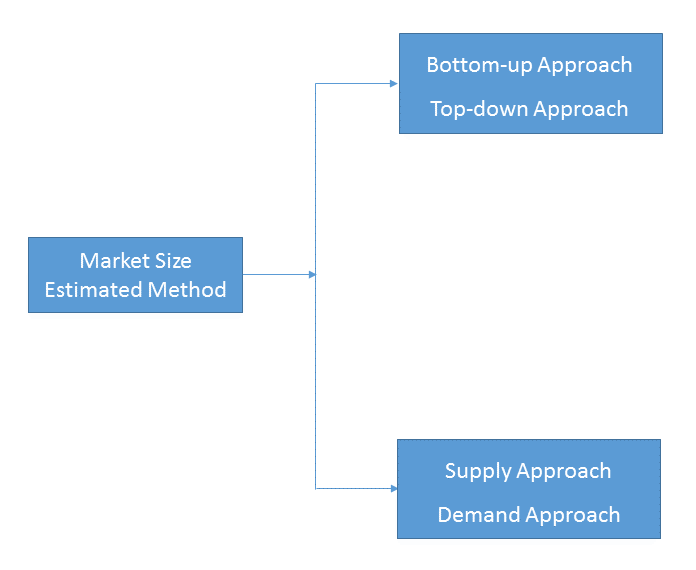
1)Top-down & Bottom-up Approach
Top-down approach uses a general market size figure and determines the percentage that the objective market represents.
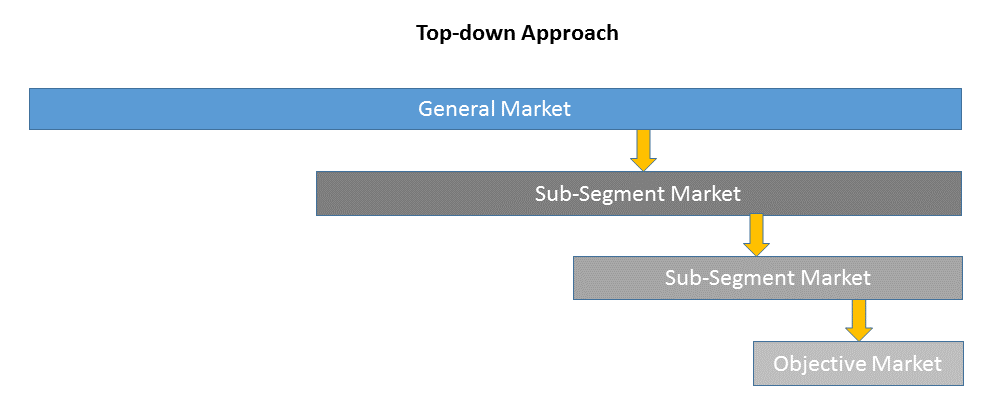
Bottom-up approach size the objective market by collecting the sub-segment information.

2)Supply & Demand Approach
Supply approach is based on assessments of the size of each competitor supplying the objective market.
Demand approach combine end-user data within a market to estimate the objective market size. It is sometimes referred to as bottom-up approach.
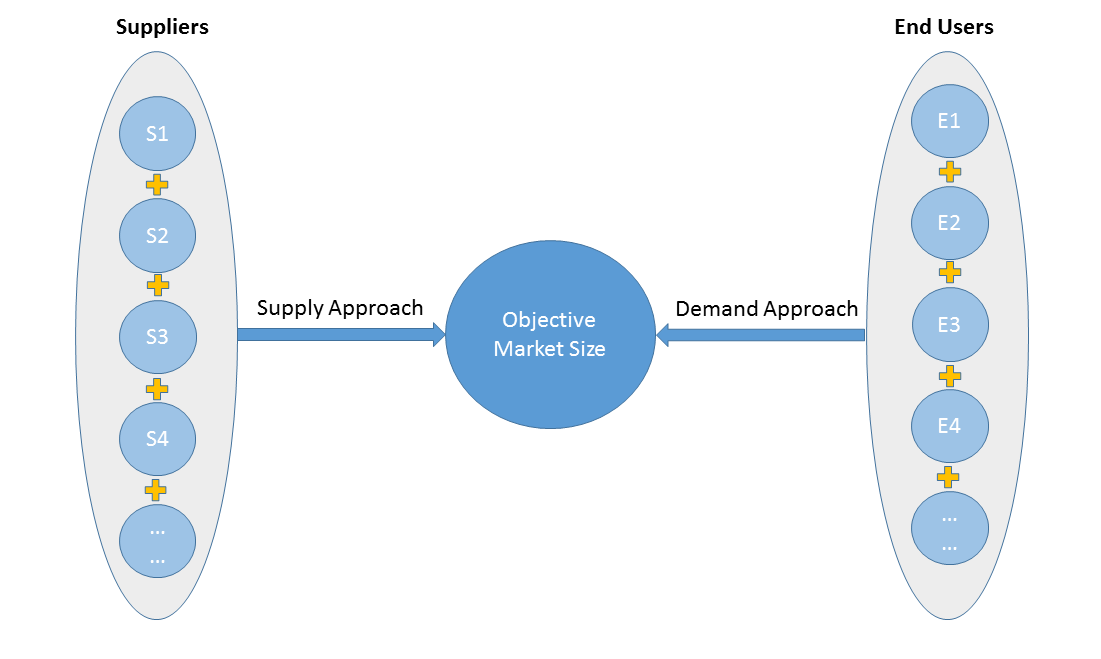
- Forecasting Methodology
- Numerous factors impacting the market trend are considered for forecast model:
- New technology and application in the future;
- New project planned/under contraction;
- Global and regional underlying economic growth;
- Threatens of substitute products;
- Industry expert opinion;
- Policy and Society implication.
- Analysis Tools
1)PEST Analysis
PEST Analysis is a simple and widely used tool that helps our client analyze the Political, Economic, Socio-Cultural, and Technological changes in their business environment.
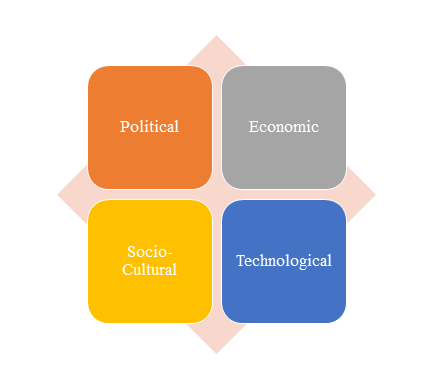
- Benefits of a PEST analysis:
- It helps you to spot business opportunities, and it gives you advanced warning of significant threats.
- It reveals the direction of change within your business environment. This helps you shape what you’re doing, so that you work with change, rather than against it.
- It helps you avoid starting projects that are likely to fail, for reasons beyond your control.
- It can help you break free of unconscious assumptions when you enter a new country, region, or market; because it helps you develop an objective view of this new environment.
2)Porter’s Five Force Model Analysis
The Porter’s Five Force Model is a tool that can be used to analyze the opportunities and overall competitive advantage. The five forces that can assist in determining the competitive intensity and potential attractiveness within a specific area.
- Threat of New Entrants: Profitable industries that yield high returns will attract new firms.
- Threat of Substitutes: A substitute product uses a different technology to try to solve the same economic need.
- Bargaining Power of Customers: the ability of customers to put the firm under pressure, which also affects the customer's sensitivity to price changes.
- Bargaining Power of Suppliers: Suppliers of raw materials, components, labor, and services (such as expertise) to the firm can be a source of power over the firm when there are few substitutes.
- Competitive Rivalry: For most industries the intensity of competitive rivalry is the major determinant of the competitiveness of the industry.
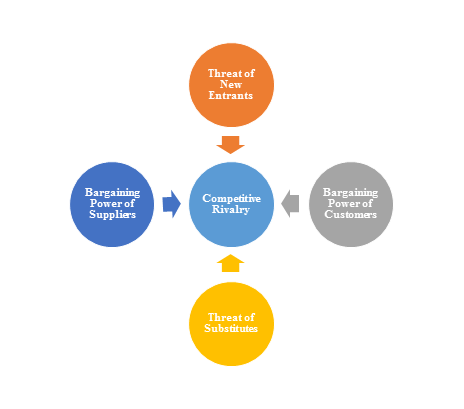
3)Value Chain Analysis
Value chain analysis is a tool to identify activities, within and around the firm and relating these activities to an assessment of competitive strength. Value chain can be analyzed by primary activities and supportive activities. Primary activities include: inbound logistics, operations, outbound logistics, marketing & sales, service. Support activities include: technology development, human resource management, management, finance, legal, planning.
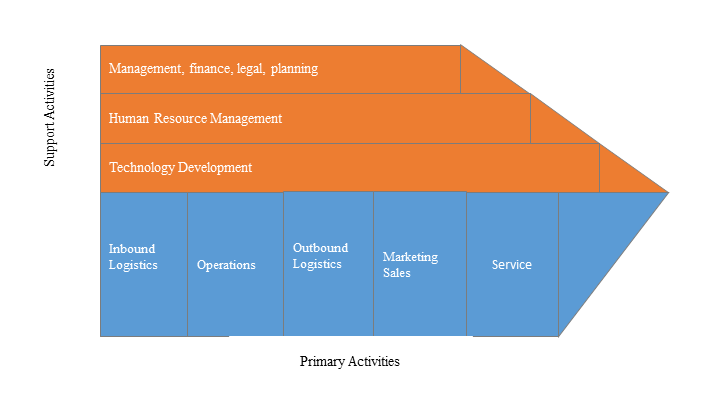
4)SWOT Analysis
SWOT analysis is a tool used to evaluate a company's competitive position by identifying its strengths, weaknesses, opportunities and threats. The strengths and weakness is the inner factor; the opportunities and threats are the external factor. By analyzing the inner and external factors, the analysis can provide the detail information of the position of a player and the characteristics of the industry.
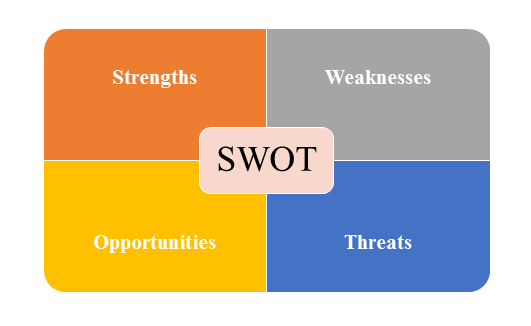
- Strengths describe what the player excels at and separates it from the competition
- Weaknesses stop the player from performing at its optimum level.
- Opportunities refer to favorable external factors that the player can use to give it a competitive advantage.
- Threats refer to factors that have the potential to harm the player.
- Data Sources
| Primary Sources | Secondary Sources |
|---|---|
| Face to face/Phone Interviews with market participants, such as: Manufactures; Distributors; End-users; Experts. Online Survey |
Government/International Organization Data: Annual Report/Presentation/Fact Book Internet Source Information Industry Association Data Free/Purchased Database Market Research Report Book/Journal/News |